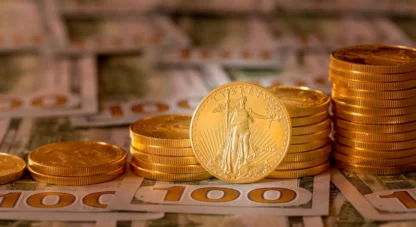People who endeavor to walk in the ancient paths “where the good way is” have been perplexed these past several decades. They know that it’s good to work hard, save money, tell the truth, keep promises, respect others, not steal, and so on. And they know that those who violate these precepts are, in the end, brought low by their actions—along with many around them. So why has America prospered so immensely by violating virtually every one of these dicta?
Travelers of the old road have watched as the US has reconstructed itself as a unitary state rather than a federation; as a democracy rather than a republic; under rule of man rather than rule of law; from limited government to big government; from deistic to humanistic presuppositions; and so on.
They’ve watched as we moved from sound money to fiat money, from flawed meritocracy to inherently flawed victimology, from frugality to profligacy, from justice to offender rehabilitation, from logic to propaganda, and much, much more. Still, the US is ostensibly the wealthiest and militarily strongest nation in the world.
Is this a new world? Are all the old verities obsolete? Are old-path travelers condemned to ridicule and counterproductivity? You’d be forgiven for thinking so. The thought has likely passed through most of our minds.
If you’ve seen more than a few springtimes and informed yourself by reading the works of old-path travelers over the years, you’ve seen how they predicted dire consequences for our wholesale violation of natural law. It has been said of some of them that they predicted 10 of the last three catastrophes. Others conscientiously extrapolated adverse trends to their natural ends—and erred because things changed.
But there have been other consequences among lovers of the old ways. When price inflation didn’t follow massive monetary inflation; when military losses didn’t follow a change in focus from winning wars to supporting political objectives; when education changed from liberal arts to liberal propaganda; when dollar preeminence didn’t go away following stupendous levels of economic mismanagement; when national wealth apparently increased despite huge increases in personal, corporate, and national debt; the scope of analysis had to change. Clearly, much more was involved than thoughtlessly applying ancient precepts. There is more complexity than suspected. It’s true regarding our cultural and political leaders that, “the people of this world are more shrewd in dealing with their own kind than are the people of the light.”
Some people of the light have been paying attention. Their already substantive analysis has deepened and expanded significantly over the years. The phenomena they discuss are relevant and impactful regarding your financial and physical health. There is much you can learn. But not everything has changed. Complexity doesn’t alter the outcome. It just delays it.
In the end, as Kipling advises,
“As surely as Water will wet us, as surely as Fire will burn,
The Gods of the Copybook Headings with terror and slaughter return!”
Key Takeaways:
- Is deflation good or bad? Yes
- Inflation is calling; is anybody listening?
- When emotion rules
- Gold’s long-awaited pullback is pitiful
The McAlvany Weekly Commentary: David and Kevin are unique hosts in several ways, not least of which are their complementary polymathic interests and accomplishments. All aspects of economics and finance, skiing, flying, endurance racing, mountain biking, travel, philosophy, celestial navigation, theology, science, mathematics, literature, music (Kevin plays the trumpet beautifully—and you know he can sing 😉 ), history, and much more—along with voracious reading on a wealth of subjects—comprise the pursuits of these two active minds and persons. So when they endeavor to boil a complex subject down for popular consumption, you can be sure both that they know whereof they speak, and that their synopsis will be both insightful and understandable. They do that this week in describing the difference between asset deflation and price deflation. Sound esoteric? Irrelevant? You’ll have an “I coulda had a V8” moment. It’s that important. The hosts apply this subject to China; they also discuss deflation’s antithesis—inflation—and its unwelcome reappearance in Western economies; and they discuss China more generally, with emphasis on its increasing problems and decreasing trade with the US.
Credit Bubble Bulletin: Reminding us that “the devil is in the details,” Doug proceeds this week to give us the details. He provides them in data, in context, and in full. The inflation dragon might have been mostly dead all day, but he just woke up and singed wide swaths of the economy. “In data that should have the Fed on edge, monthly Core Services Inflation jumped to 0.7% from 0.4%. “Supercore” (Services excluding shelter) inflation accelerated in January to a 21-month high 0.8%. Shelter prices rose to 0.6% from 0.4%, with 6.0% y-o-y inflation. Medical Care Services gained 0.7%, with Health Insurance prices jumping 1.4% during the month… Transportation Services jumped 1.0% for the month…” These inflation prints affected bonds, equities, and currencies, “But a curious thing happened on the way to inflation-induced market instability: Most financial conditions indicators were impervious.” Click on the link to read more.
Hard Asset Insights: Joining Doug in citing statistics showing increasing inflation, Morgan chooses a different road to explore in consequence. While markets are ignoring or shrugging off all kinds of negative information, reality will ultimately have its day. Positive emotion is something like hydrogen: it’s powerful when it’s contained and directed, but it disperses or burns off rapidly when it’s not. And the container in this case is confidence—confidence in the Fed, confidence in the herd, and confidence in the system. Morgan discusses what happens when that container is ruptured. “Remember, above all else this bubble is a confidence bubble… But when rock-solid consensus confidence amid an ultimate confidence bubble turns to a renewed surge of uncertainty—and that risk is alive—resurgent uncertainty could put a match to the powder keg.” Don’t miss this incisive analysis.
Golden Rule Radio: Rob rejoins Tory and Miles to look at the latest developments in the metals this week. At program time, gold had finally retraced in very much the way and to the extent Miles has been predicting. But both its late appearance and its quick bounce back (it has since resumed levels above $2,010/oz.) indicate the strength of gold in a market that would ordinarily challenge its dollar price. As the hosts turn to the analysis of silver, they note that the white metal has diverged from gold in its price action. Gold is in the upper portion of its all-time trading range, while silver is at less than half of its all-time highs and showing little desire to break out higher. “I think silver’s playing its own game,” notes Miles. The hosts briefly look at platinum before Rob gives a concentrated analysis of palladium. Between its roller-coaster industrial uses and political considerations arising from where it is chiefly mined, palladium might have farther to fall.















